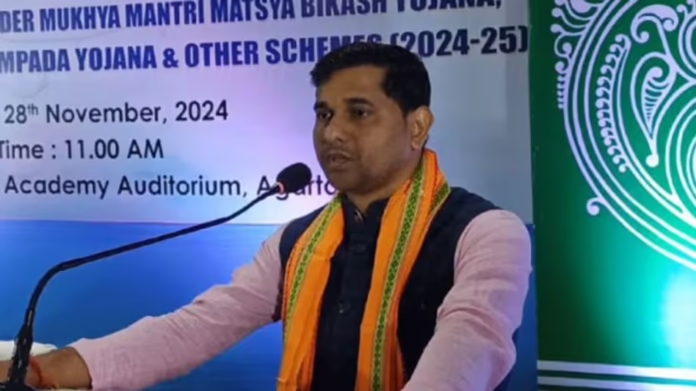Tripura Fisheries Minister Sudhangshu Das has announced a series of initiatives aimed at increasing fish production to meet the rising demand in the state. He emphasized the government’s commitment to making Tripura self-sufficient in fish supply while reducing dependence on imports.
The state has prioritized expanding fish farming by encouraging local farmers to adopt advanced techniques. Officials have been conducting training programs to educate fish farmers on scientific breeding methods, pond management, and disease prevention. The government has also facilitated access to quality fish seeds and feed, ensuring higher yields and healthier fish stocks.
To enhance fish production, the government has increased financial assistance to farmers. Subsidies for constructing new ponds and renovating existing ones have motivated more people to engage in fish farming. Banks and cooperative societies have extended easy credit options, making it easier for farmers to invest in infrastructure and technology.
Irrigation systems have been upgraded to provide better water quality and sustain fish growth. The government has introduced biofloc and recirculating aquaculture system (RAS) technology, which optimizes water usage and increases production efficiency. Farmers who adopt these modern techniques have reported significant improvements in yield.
Tripura has also witnessed the expansion of fish hatcheries, ensuring a consistent supply of fish seeds throughout the year. By promoting indigenous fish species alongside commercially viable ones, authorities have maintained ecological balance while meeting consumer demand. The Fisheries Department has actively encouraged the breeding of high-yield varieties like Pangasius and Tilapia.
Cold storage facilities and transportation networks have been strengthened to maintain fish quality and prevent spoilage. The government has set up processing units to add value to fish products, creating new economic opportunities for local entrepreneurs. With better market access, fish farmers now receive fair prices for their produce.
The minister also highlighted the role of cooperatives and self-help groups in strengthening the fisheries sector. Women-led cooperatives have gained prominence in fish farming, contributing to both economic growth and social empowerment. Training sessions and workshops have equipped these groups with the knowledge and resources needed to succeed.
Efforts to conserve natural water bodies have further supported fish production. Authorities have enforced strict regulations against illegal fishing practices and pollution. Regular stocking of reservoirs and lakes with fish seeds has ensured sustainable growth in production.
Tripura has actively promoted integrated fish farming, where farmers combine fish culture with paddy farming and livestock rearing. This method has maximized land use while increasing farmers’ incomes. By integrating fisheries with agriculture, the state has created a more resilient and diversified rural economy.
Research and development initiatives have played a key role in modernizing the fisheries sector. Collaboration with academic institutions has led to innovative farming solutions. Scientists and experts have introduced improved breeding techniques and disease control measures, benefiting fish farmers across the state.
The government has also launched awareness campaigns to educate the public about the benefits of consuming locally produced fish. By reducing reliance on fish imports, Tripura has strengthened its food security and ensured the availability of fresh and nutritious seafood for its population.
Minister Sudhangshu Das reiterated the government’s vision to transform Tripura into a hub for fish production in the Northeast. With continued investment in infrastructure, technology, and farmer support, the state is on track to achieving self-sufficiency in fish supply. The proactive measures taken by the government have not only boosted production but also created employment opportunities and improved livelihoods for thousands of fish farmers.


